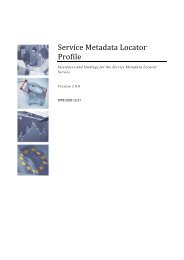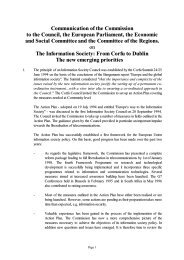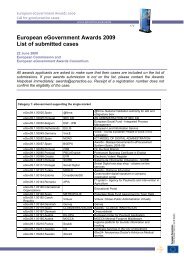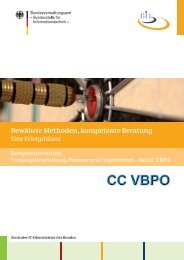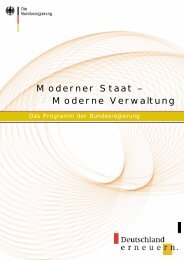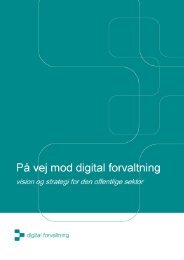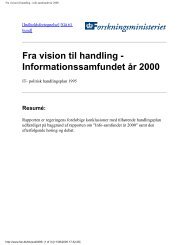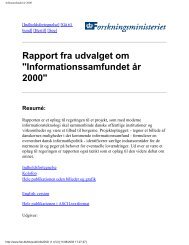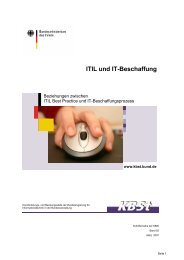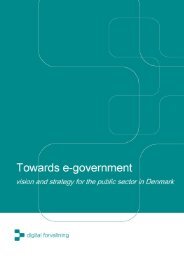Comparative Study of Public e-Service Centres in - ePractice.eu
Comparative Study of Public e-Service Centres in - ePractice.eu
Comparative Study of Public e-Service Centres in - ePractice.eu
You also want an ePaper? Increase the reach of your titles
YUMPU automatically turns print PDFs into web optimized ePapers that Google loves.
PUBLIC E-SERVICE CENTRES IN EUROPE<br />
Lessons learnt<br />
Lesson 1: WiN works from a project management perspective. Kuipers: “Often we are<br />
confronted with result orientated policy objectives set by a local government. For example<br />
they want to organise a festival for marg<strong>in</strong>alised young people and request that fifteen<br />
different organisations and groups are <strong>in</strong>volved <strong>in</strong> order to guarantee proportional<br />
representation. This does not work for an <strong>in</strong>itiative like WiN. We work programme related and<br />
bottom-up. We cannot guarantee the participation <strong>of</strong> all these groups. In our approach we<br />
need freedom and trust to let us organise the best ways to <strong>in</strong>volve users. Our methods and<br />
track record should give enough assurance to the policy makers. But this is not always the<br />
reality.”<br />
Lesson 2: A project like WiN needs three years (at least) to work on methodology, to build a<br />
track record and to manage sett<strong>in</strong>g up all aspects <strong>of</strong> the organisation at national and local<br />
level. Then a period <strong>of</strong> consolidation and growth starts. This should be followed by a period <strong>of</strong><br />
codification <strong>in</strong> which methodology and results are properly analysed, adjusted and<br />
dissem<strong>in</strong>ated. In local, national and European programmes this development is not<br />
recognised and it is almost impossible to get any f<strong>in</strong>ance for this codification phase.<br />
Lesson 3: Workers <strong>in</strong> the social sector are not by default <strong>in</strong>terested <strong>in</strong> educat<strong>in</strong>g their clients<br />
<strong>in</strong> eSkills. Conv<strong>in</strong>c<strong>in</strong>g social sector workers <strong>of</strong> the benefits <strong>of</strong> eSkills support needs a<br />
coord<strong>in</strong>ated and sensible approach.<br />
G. Policy & Strategy<br />
WiN operates <strong>in</strong> the fields <strong>of</strong> health, education, science, culture, media, and employment.<br />
This means its activities contribute to policy objectives <strong>of</strong> five m<strong>in</strong>istries <strong>in</strong> the Netherlands.<br />
But projects like WiN only succeed if they have enough back<strong>in</strong>g and the support <strong>of</strong> various<br />
partners <strong>in</strong> the sport, welfare, labour, and health sector.<br />
WiN has this support but this is the pitfall: WiN, be<strong>in</strong>g multi-sectoral, does not qualify for many<br />
subsidies and policy arrangements as M<strong>in</strong>istries do not acknowledge the activities <strong>of</strong> WiN as<br />
their primary responsibility and po<strong>in</strong>t to other departments with<strong>in</strong> government. As a result, all<br />
the support, awards and recognition do not result <strong>in</strong> structural f<strong>in</strong>ancial support or <strong>in</strong> project<br />
f<strong>in</strong>ance.<br />
The national board <strong>of</strong> WiN has plans for expansion and is look<strong>in</strong>g for partners to be able to<br />
scale up to more neighbourhoods.<br />
- 13 -




